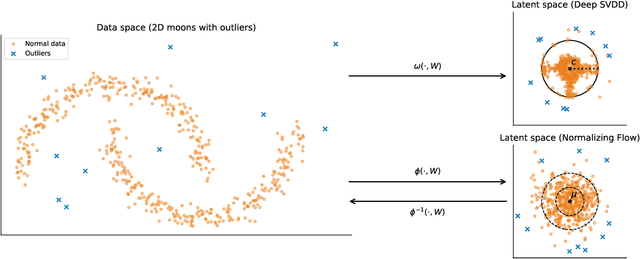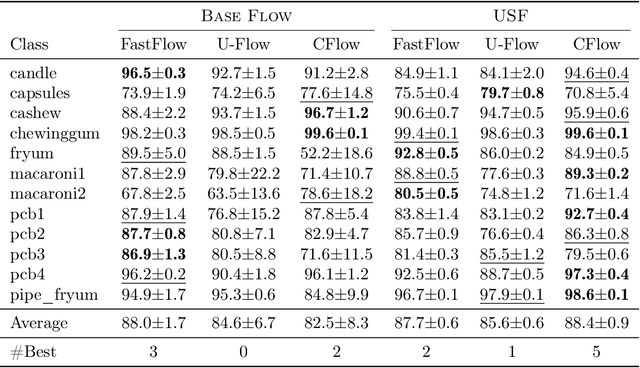Tim Katzke
On Uniformly Scaling Flows: A Density-Aligned Approach to Deep One-Class Classification
Oct 10, 2025



Abstract:Unsupervised anomaly detection is often framed around two widely studied paradigms. Deep one-class classification, exemplified by Deep SVDD, learns compact latent representations of normality, while density estimators realized by normalizing flows directly model the likelihood of nominal data. In this work, we show that uniformly scaling flows (USFs), normalizing flows with a constant Jacobian determinant, precisely connect these approaches. Specifically, we prove how training a USF via maximum-likelihood reduces to a Deep SVDD objective with a unique regularization that inherently prevents representational collapse. This theoretical bridge implies that USFs inherit both the density faithfulness of flows and the distance-based reasoning of one-class methods. We further demonstrate that USFs induce a tighter alignment between negative log-likelihood and latent norm than either Deep SVDD or non-USFs, and how recent hybrid approaches combining one-class objectives with VAEs can be naturally extended to USFs. Consequently, we advocate using USFs as a drop-in replacement for non-USFs in modern anomaly detection architectures. Empirically, this substitution yields consistent performance gains and substantially improved training stability across multiple benchmarks and model backbones for both image-level and pixel-level detection. These results unify two major anomaly detection paradigms, advancing both theoretical understanding and practical performance.
Unsupervised Surrogate Anomaly Detection
Apr 29, 2025Abstract:In this paper, we study unsupervised anomaly detection algorithms that learn a neural network representation, i.e. regular patterns of normal data, which anomalies are deviating from. Inspired by a similar concept in engineering, we refer to our methodology as surrogate anomaly detection. We formalize the concept of surrogate anomaly detection into a set of axioms required for optimal surrogate models and propose a new algorithm, named DEAN (Deep Ensemble ANomaly detection), designed to fulfill these criteria. We evaluate DEAN on 121 benchmark datasets, demonstrating its competitive performance against 19 existing methods, as well as the scalability and reliability of our method.
A Cautionary Tale About "Neutrally" Informative AI Tools Ahead of the 2025 Federal Elections in Germany
Feb 21, 2025Abstract:In this study, we examine the reliability of AI-based Voting Advice Applications (VAAs) and large language models (LLMs) in providing objective political information. Our analysis is based upon a comparison with party responses to 38 statements of the Wahl-O-Mat, a well-established German online tool that helps inform voters by comparing their views with political party positions. For the LLMs, we identify significant biases. They exhibit a strong alignment (over 75% on average) with left-wing parties and a substantially lower alignment with center-right (smaller 50%) and right-wing parties (around 30%). Furthermore, for the VAAs, intended to objectively inform voters, we found substantial deviations from the parties' stated positions in Wahl-O-Mat: While one VAA deviated in 25% of cases, another VAA showed deviations in more than 50% of cases. For the latter, we even observed that simple prompt injections led to severe hallucinations, including false claims such as non-existent connections between political parties and right-wing extremist ties.
 Add to Chrome
Add to Chrome Add to Firefox
Add to Firefox Add to Edge
Add to Edge